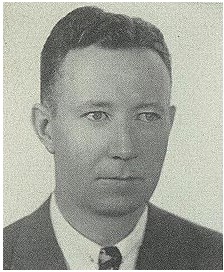T. Vincent Quinn

Vincent Quinn (1947-48)
Early History: Thomas Vincent Quinn was born in Long Island City, New York, on March 16, 1903. He received his LL.B. degree from Fordham University School of Law in 1924. Mr. Quinn practiced law in New York City at a law firm and a corporation before he joined the Queens County (New York) District Attorney’s Office in 1931. He served as an Assistant District Attorney in Queens County for three years. In 1934, Mr. Quinn joined the Department of Justice as an Assistant United States Attorney in the Eastern District of New York. He twice served as Acting United States Attorney. Notable prosecutions during his 13-year tenure included the first indictment in Brooklyn against two lawyers for conspiracy to commit subornation of perjury, and the prosecution of a Brooklyn family that assisted escaped Italian prisoners of war.
Tenure: President Harry S. Truman nominated Mr. Quinn to be the Assistant Attorney General for the Criminal Division and he was confirmed by the Senate on July 15, 1947. During his 13 months in this position, Mr. Quinn was involved in the discussions preceding the prosecution of Iva Toguri D’Aquino, or Tokyo Rose. In addition, he participated in the 1948 sentencing of Robert Best, an American newspaperman convicted of being a Nazi radio propagandist during World War II. It was later reported that Mr. Quinn handled much of the evidence leading to the trial and conviction of the country’s top communists during his tenure
Later Career: Mr. Quinn left the Department in 1948 to run as the Democratic nominee for the U.S. House of Representatives for New York’s 5th Congressional District. He was elected and served one 2-year term, after which he ran for Queens County District Attorney. Mr. Quinn was elected District Attorney and began serving in that position in January 1952.
In 1953, Mr. Quinn was indicted by federal grand juries in both Brooklyn and Manhattan under a rarely-used statute for representing private law clients in federal income tax cases while serving in Congress. Two former law partners were indicted with him on charges of aiding and abetting him in illegally receiving fees for the cases. Mr. Quinn denounced the indictment, telling the media that it was retribution for his efforts to fight communism. He continued to serve as District Attorney for the next two years—while his federal case was pending trial—until he lost the Democratic primary for Queens County District Attorney in 1955.
Mr. Quinn and his two former law partners proceeded to trial in April 1956. After seven days, the judge ordered verdicts of acquittal because the United States presented no evidence that Mr. Quinn knew that some of the firm’s fees stemmed from tax cases it had handled while he was a Congressman. The following January, the United States Attorney’s Office for the Eastern District of New York dismissed its related indictment against Mr. Quinn and his former law partners.
Almost six months later, Mr. Quinn was appointed to the New York City Magistrates’ Court. He served as a magistrate until 1962, when the court was merged with the New York City Criminal Court. After the merger, he was a judge on The Criminal Court of New York City until his retirement in 1972. Later, Mr. Quinn moved to Venice, Florida, where he lived until his death in 1983. At the time of his passing, he was survived by his wife, two daughters, and six grandchildren.
This material is based on the review of a variety of historical sources and its accuracy cannot be guaranteed. If you have any corrections or additional information about this individual or about the history of the Criminal Division, please contact the Division.

 U.S. Department
of Justice
U.S. Department
of Justice